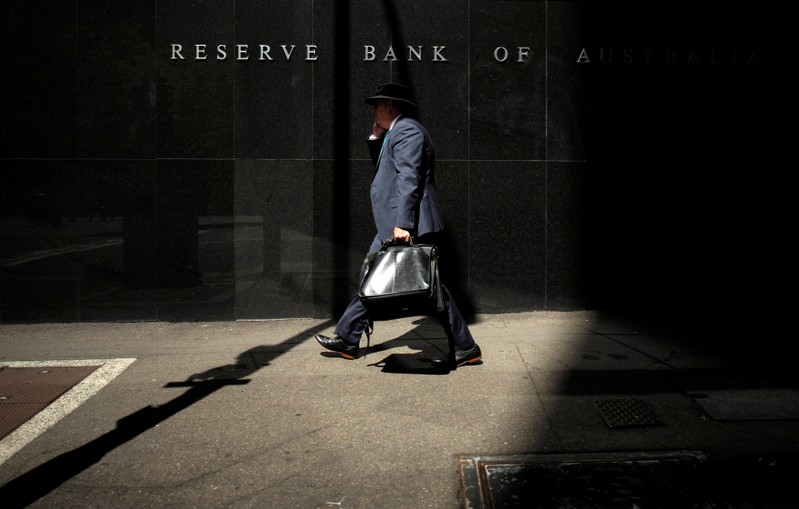
FILE PHOTO: A Sydney businessman walks into the light outside the Reserve Bank of Australia (RBA), February 3, 2015. REUTERS/Jason Reed/File Photo
May 7, 2019
By Swati Pandey
SYDNEY (Reuters) – Australia’s central bank kept rates at record lows on Tuesday while signaling future cuts if the unemployment rate failed to nudge lower as the country’s retailers suffered their worst quarter in nearly seven years.
The Reserve Bank of Australia’s (RBA) decision to hold rates at 1.50 percent wrong-footed some doves and sent the Aussie dollar jumping to a one-week top of $0.7048.
Calls from some analysts for the RBA to ease policy at its May meeting intensified after first-quarter inflation came in below expectations last month to undershoot the central bank’s 2-3 percent target for 13 straight quarters.
In holding the cash rate, the RBA board “recognized that there was still spare capacity in the economy and that a further improvement in the labor market was likely to be needed for inflation to be consistent with the target,” it added.
“Given this assessment, the Board will be paying close attention to developments in the labor market at its upcoming meetings,” the RBA said.
At the same time, the RBA characterized the labor market as “strong” and said it expected the unemployment rate to ease to 4.75 percent in 2021 from current levels of 5 percent where it has stayed for almost six months now.
Most economists said the statement had an “implicit” easing bias with the RBA still sounding broadly confident about the economy despite a run of disappointing data lately.
The on-hold decision comes just 10 days before a closely-fought national election where Prime Minister Scott Morrison is campaigning on being a strong economic manager. The opposition Labor Party – the favorites to win – is championing workers rights, including stronger wage growth and personal tax cuts.
Analysts expect some sort of fiscal stimulus irrespective of which party wins this month.
“After digesting the RBA’s words and deeds, we have to respect the RBA’s endless patience and ‘reluctant cutter’ stance,” said Annette Beacher, Singapore-based macro-strategist at TD Securities.
A majority of the 42 economists polled by Reuters in late-April, including Beacher, expect the RBA to cut rates twice by year-end. [AU/INT]
But “if the labor market remains surprisingly resilient, the risk is now a later move,” UBS economist George Tharenou said in a note.
MAIN UNCERTAINTY
The RBA has tolerated sub-target inflation for 16 of the past 18 quarters by keeping rates unchanged since August 2016 as other economic indicators including the jobless rate showed signs of improvement.
On Tuesday, it acknowledged that consumer prices were “noticeably weaker” than anticipated though they were expected to pick up, albeit gradually. Economic growth was also seen growing around trend at 2.75 percent this year and next.
One reason for subdued inflation is depressed household consumption, which the RBA singled out as the “main domestic uncertainty” for its outlook.
Cementing that view, earlier data on Tuesday showed retail sales rose a tepid 0.3 percent in March compared with an upwardly revised 0.9 percent in February.
For the first quarter, sales fell 0.1 percent in inflation-adjusted terms for its first negative reading since the September quarter of 2012 and followed an already sedate December quarter.
The soft result implies retail sales did not contribute to growth in Australia’s A$1.9 trillion economy in the March quarter. It also adds to growing evidence of a rocky outlook, given household spending accounts for around 57 percent of annual gross domestic product.
The focus now shifts to the RBA’s quarterly economic outlook due at 0130 GMT Friday.
“Recognition that inflation will hold below the bottom of the 2-3 per cent target band for 2019 and 2020 will signal the need for further policy easing,” Westpac chief economist Bill Evans said.
(Additional reporting by Wayne Cole; Editing by Sam Holmes and Jacqueline Wong)
